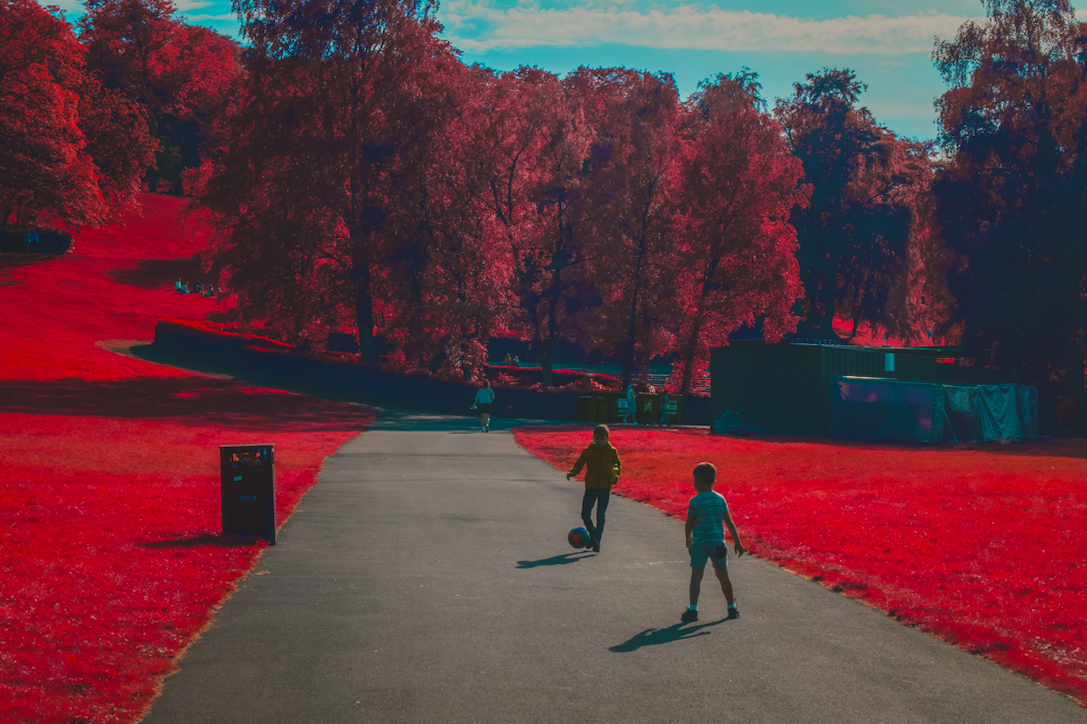[Written by Lucy Mclaughlin]
[Image Credits: ‘PLAYGROUND’ by James Yeung]
If you’re someone like me (and you must be if you’re choosing to read an article on such a topic), then you’ll likely be able to foster some idea of what ‘eco-anxiety’ is. To put it simply, eco-anxiety is a chronic concern for environmental threats.
Experienced to a greater extent by those who are more left-aligned, eco-anxiety has slowly but surely crept its way into many of our mental spaces. This could be for numerous reasons, but, from my own research, I would blame it on the modern-day scapegoat of social media. It is no secret that social media plays an intrinsic role in our lives until our curated feeds quickly become places of overbearing consistency; eco-anxiety is no exception to this rule. For those who willingly seek out environmental content, social media feeds can continually reinforce a state of doom and gloom about ‘Mother Earth’.
Through its consistent presence on our digital platforms and news headlines, eco-anxiety has become a moral panic of sorts. Environmental decline is dissimilar to other moral issues as the more research we do on the subject, the more despair we tend to invoke. Unfortunately, at least in this case, click-bait headlines are often well-grounded in evidence, both in the form of research and in the unequivocal fact of seeing natural disasters unfold. Personal research (and/or Greta Thunberg) have probably also made you realise that worldwide systematic change needs to occur to save the planet. This, I believe, is the difference between eco-anxiety and other triggers of anxiety as individual action cannot solve the environmental problem at large. For example, taking your keep-cup to Starbucks can feel a bit useless when you realise that only mass change – which is out of your control – can rescue the planet from complete ruin. However, it is relevant to say that as our brains are naturally wired to react to threat, such an anxiety-induced response is only to be expected. For example, how can we not feel threatened when the word ‘crisis’ is plastered everywhere we look? Sarah Niblock of the UK Council for Psychotherapy rightly goes as far to say that eco-anxiety “is not an illness or disorder, it’s a perfectly normal and healthy reaction”.
There is an alarmingly little amount of research on how to combat eco-anxiety within the UK and how this may impact our mental health services and the NHS. I spoke to an anonymous volunteer from a mental health helpline on the matter who noted that societal issues certainly cause anxiety to people. They added that their particular service had in fact received concerned calls about the environment and Greta Thunberg – both positive and negative. Contrastingly, eco-anxiety has been studied and written on much more widely in the United States. This drive for research could potentially be caused by the fact that many Americans have already first-handedly experienced climate crisis through wildfires, droughts and hurricanes, for example. In fact, for some people, eco-anxiety has become less of a concern of impending doom and more of a hellish reality.
Moving back to the UK, it appears there’s been more quasi-concerned, satirical articles published as opposed to informed studies on the matter. A recent piece on eco-anxiety in The Times asks: “[is] serving meat at a dinner party a bit gauche, like forcing everyone to play Twister?”. While comical spins like these can be light-hearted relief for some, it can be read as a condescending and a brushing-under-the-rug attitude for those who are genuinely suffering daily because of climate concern. Perhaps the urgency and seriousness of eco-anxiety and its potential effects on the health service has not reached Britain yet, but with the statistics that accompany the mental health epidemic, I hope it does soon.
I will abstain from trying to offer a solution for eco-anxiety myself as I honestly do not believe there is a universal answer to it. I suppose we must treat it as we do with all seemingly world-wide panics and take each new tweet or headline with a pinch of salt. However, what I can offer you are some lesser known ways in which scientists and researchers are working to create a more sustainable tomorrow. For example, scientists have found a new way to breed cows so that methane production is significantly reduced. And LUSH Cosmetics have also created a sustainably farmed cork pot which, on its journey from Portugal to Poole, actually creates a carbon-positive trip. There’s more research out there which will ignite the environmental optimist in you, should you look for it.

